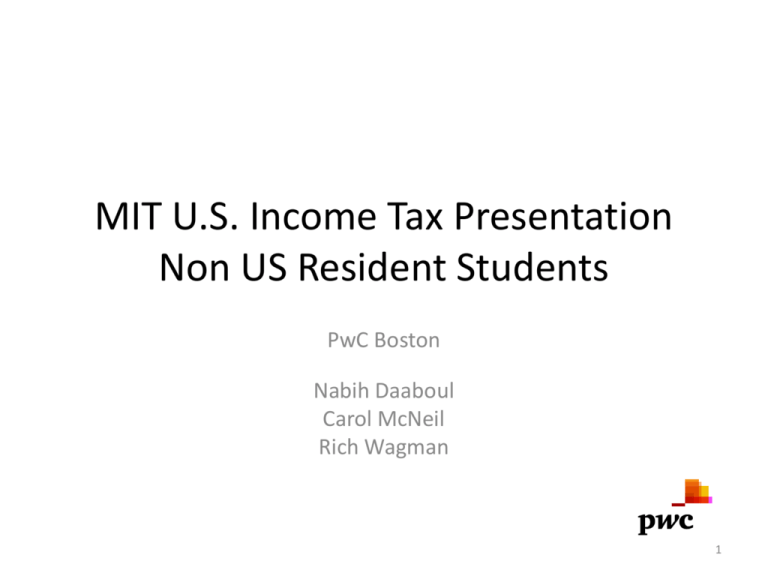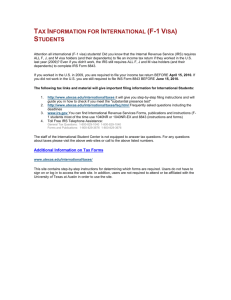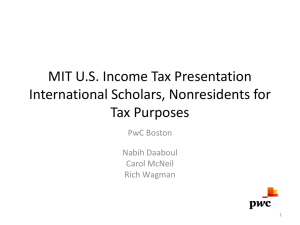MIT U.S. Income Tax Presentation International Students
advertisement

MIT U.S. Income Tax Presentation Non US Resident Students PwC Boston Nabih Daaboul Carol McNeil Rich Wagman 1 Basic U.S. Tax Overview for International Students • A “foreign national” is a person born outside of the U.S. • For immigration purposes, a “Nonresident Alien” is a foreign national who is in the U.S. on a nonimmigrant visa • For tax purposes, a Nonresident Alien is a foreign national visa holder with specific tax filing requirements, tax withholding requirements and tax characteristics • If you were not present in the U.S. in 2014, then you do not need to file tax returns this tax season. Your first tax return filings would be due in 2016 for the 2015 tax year. 2 Federal and State Taxation • All individuals required to pay tax in the US will generally pay at both the federal and state level. • The term “Federal” refers to the US government. The Internal Revenue Service (“IRS”) administers the collection of federal taxes. • Taxpayers may also be required to pay tax at the state level. The collection of Massachusetts tax is administered by the Massachusetts Department of Revenue. 3 Federal Income Tax • All wages paid to employees, scholarships, fellowships, lodging, benefits or grants are generally taxable unless specifically exempt from tax by a U.S. law or treaty between the U.S. and a foreign country • Fellowship and scholarship payments are taxable for payments not used for tuition and fees • Income tax treaties may provide for exemption from tax • If treaty applies at federal level, it should apply at the Massachusetts level as well 4 U.S. Tax Requirements • General rule – all income received in the U.S. by a nonresident alien may be subject to tax. • Tax treaties between the U.S. and your home country may provide for exemption from tax • Each treaty is different • If income is not exempt, the nonresident alien pays U.S. tax only on income from sources inside the U.S. • All nonresident aliens with US source income should file tax form 1040NR or 1040NR-EZ and Form 8843, even if all income is exempt from taxation due to treaty • If there is no US income, only Form 8843 must be filed by June 15th 5 U.S. Income Tax Treaties • Armenia, Australia, Austria, Azerbaijan, Bangladesh, Barbados, Belarus, Belgium, Bulgaria, Canada, China, Cyprus, Czech Republic, Denmark, Egypt, Estonia, Finland, France, Georgia, Germany, Greece, Hungary, Iceland, India, Indonesia, Ireland, Israel, Italy, Jamaica, Japan, Kazakhstan, Korea, Kyrgyzstan, Latvia, Lithuania, Luxembourg, Malta, Mexico, Moldova, Morocco, Netherlands, New Zealand, Norway, Pakistan, Philippines, Poland, Portugal, Romania, Russia, Slovak Republic, Slovenia, South Africa, Spain, Sri Lanka, Sweden, Switzerland, Tajikistan, Thailand, Trinidad and Tobago, Tunisia, Turkey, Turkmenistan, Ukraine, United Kingdom, Uzbekistan, Venezuela • IRS Publications 515 and 901 detail the benefits available to nonresident aliens taking advantage of tax treaties 6 Social Security Number or ITIN • • • • • • IRS regulations require a nonresident alien to have either a social security number (“SSN”) or individual taxpayer identification number (“ITIN”) to claim treaty benefits Social security numbers can be obtained at the local Social Security Administration Office ITINs are available only if you do not qualify for a social security number Individuals seeking an ITIN must submit Form W-7 along with proof of foreign status or identity (usually a passport). Under the new IRS guidelines, the original documentation or a copy certified by the original issuing agency must be provided. Alternatively, you can use a designated IRS Taxpayer Assistance Center or a Certifying Acceptance Agent to certify and submit the documentation. NOTE – the process to receive either a SSN or ITIN is complex and can not be completed quickly. Planning well ahead before filing tax returns is essential Visit the MIT International Students Office for details on the SSN and ITIN process http://web.mit.edu/iso/students/ssn.shtml 7 Who Needs an ITIN? • The IRS issues ITINs to foreign nationals and others who have federal tax reporting or filing requirements and do not qualify for SSNs. • A nonresident alien individual not eligible for a SSN who is required to file a US income tax return only to claim a refund of tax under the provisions of a US tax treaty needs an ITIN. • Other examples of individuals who need ITINs include: – A nonresident alien required to file a US income tax return – A US resident alien (based on days present in the US) filing a US income tax return – A dependent or spouse of a resident alien – A dependent or spouse of a nonresident alien visa holder 8 How to Apply for an ITIN • • • • • • • To obtain an ITIN, you must complete IRS Form W-7, IRS Application for Individual Taxpayer Identification Number Most often, you will request an ITIN as part of filing your US income tax return You attach the Form W-7 to the front page of your valid federal income tax return You must include proof of identity document(s) with your application If you choose to send in your original passport with your application, no other documents are required If you wish to send copies of documents as long as they are either certified by the issuing agency or you have them certified at a US Embassy or Consulate office (it is highly recommended you call in advance to insure these services can be performed) If you are using certified copies of documents to prove your foreign status or identity, two of the following documents must be included (at least one must include a photograph – note, a photograph is not required for a dependent under the age of 14 or the age of 18 if a student): – – – – – – – – – – – – US Citizenship and Immigration Services (USCIS) photo identification Visa issued by US Department of State US driver’s license US military identification card Foreign diver’s license Foreign military identification card National identification card US state identification card Foreign voter’s registration card Civil birth certificate* Medical records (valid only for dependents under age 6)* School records (valid only for dependents under age 14 or 18 if a student)* *Can be used only if foreign documents 9 How to Apply for an ITIN (cont.) • Where to apply – By mail. Mail Form W-7, your tax return and identifying documents to Internal Revenue Service ITIN Operation P.O. Box 149342 Austin, TX 78714-9342 – In person. Bring your completed forms and documentation to any IRS Taxpayer Assistance Center in the US or IRS office abroad. See IRS.gov for a list of designated centers that are available for assistance in completing applications. – Through an acceptance agent. You can also apply through an Acceptance Agent authorized by the IRS. To get a list of agents, visit IRS.gov and enter “acceptance agent program” in the search box at the top of the page. 10 U.S. Nonresident Alien Income Tax Return • A nonresident alien with earned income such as wages or taxable scholarships files Form 1040NR or Form 1040NR-EZ, U.S. Nonresident Alien Income Tax Return, each year with the IRS • All nonresident aliens also need to file Form 8843 • MIT will report earnings paid to nonresident aliens on Form W-2 and/or Form 1042-S • A tax form must be filed if any U.S. source income was earned during the year • The U.S and Massachusetts utilize the calendar year for income tax purposes (January 1 - December 31) 11 When and Where to File • Nonresident aliens who were physically present in the U.S. during any part of a calendar year should file all tax returns by April 15th of the following year • If you need more time to file your tax return, you may request an extension by filing Form 4868 to receive a six month extension of time to file to October 15th. • NOTE an extension of time to file does not extend the time to pay any taxes due. You must pay any taxes due at the time you file an extension request. • All nonresident returns are mailed to: Department of Treasury Internal Revenue Service Center Austin, TX 73301-0215 12 Form 8843 Statement for Exempt Individuals and Individuals with a Medical Condition • Form 8843 provides information about your Visa, residency, length of time in the U.S., study program, etc. and is the way you alert the IRS to your nonresident status in the U.S. • It must be filed by all nonresident aliens in F or J status regardless of income. • The Form 8843 must be filed each year with the Form 1040NR, 1040NR-EZ or by itself if a 1040NR is not required • Due date is April 15th or the extended due date of the return (generally October 15th) • If you have no US source income, you should file Form 8843 by itself no later than June 15th • A separate Form 8843 should be filed for your spouse and dependent children each year, if applicable 13 Residency Determination for U.S. Tax Purposes • A resident for U.S. tax purposes is a non U.S. citizen who meets either the “green card” test or “substantial presence” test • F and J student visa holders are generally considered residents after their first 5 calendar years (including partial years) in the U.S. For example, if you came to the US on December 31 of 2014, 2014 would count as the first year of the 5 year period. • Prior visa history must be taken into account in determining the 5 year rule 14 Substantial Presence Test • If you were in the US on a F or J visa as a student, the 5 year rule applies, otherwise the Substantial Presence Test applies as set forth below • In the U.S. for at least 31 days during 2014, and • 183 days during the three year period that includes the current year and the two preceding calendar years under the following formula – All days in the U.S. during the current year (2014) – 1/3 of the days present in the U.S. in the first preceding year (2013) – 1/6 of the days present in the U.S. in the first second preceding year (2012) • Remember the 5 year rule for counting days from the previous slide • Refer to IRS Publication 519 or MIT ISO’s Glacier Tax Prep software for assistance in determining your residency status http://web.mit.edu/iso/students/taxes.shtml 15 Fellowship Stipends • Fellowship stipends received by a degree candidate and used for qualified expenses are generally excluded from income • Qualified expenses include tuition and enrollment fees, books, supplies and equipment (must be required for all students) that are required for your course work • Qualified expenses do not include room and board and other expenses such as travel • MIT will provide Form 1042-S • You are responsible to report as taxable income (federal and state) the amount of a fellowship not used for qualified expenses • Nonqualified scholarships and fellowships are subject to 14% federal tax withholding (for F, J, M & Q visa students) unless exempt from tax because of a treaty. Other students will have 30% withholding if not on F, J, M or Q visa status. • MIT will not withhold taxes for Massachusetts purposes • Consider estimated tax payments 16 Taxable Stipends • Payment for services – TA and RA Assistantships – Payments received for past, present or future services such as teaching, research or other services will generally be taxable • MIT will issue a Form W-2 and withhold based on the Form W-4 on file (federal and state) 18 19 20 The Affordable Care Act (“ACA”) • This refers to the national health care law that started in 2014 • Under the new law, each individual is required to have health insurance that has “essential coverage” to meet the individual mandate • International students on F or J visas are exempt from the mandate to purchase ACA qualifying coverage for their first 5 years in the US • If you are a resident for US income tax purposes, you must be covered by insurance that meets the essential coverage requirements or pay a penalty – For 2014, penalty is the greater of 1% of your yearly income or $95 per person – For 2015, penalty is 2% of your yearly income or $325 per person • MIT Health Plans meet the ACA requirements • Foreign health care coverage does NOT meet the ACA requirements 21 Massachusetts Tax Filings • For Massachusetts state income tax purposes, you are deemed a full year resident if you maintain a permanent place of abode in MA and you spend more than 183 days of the taxable year in MA. • Permanent place of abode generally depends on the type of housing you live in. If off campus and not affiliated with MIT, you may be deemed to have a permanent place of abode in MA. • If you do not meet the above tests, you are generally a nonresident for MA income tax purposes. If you earned more than $8,000 and the income is not exempt from taxation under a treaty, you should file Massachusetts Form 1-NR, if you are a nonresident alien • If you are a resident, you will file MA Form 1 and you will need to prove you have health insurance so save the Form MA 1099-HC, Individual Mandate Massachusetts Health Care Coverage • You do not mail the 1099-HC form but you will need the information provided on the form to complete the Massachusetts return 22 Tax Form List • • • • • • • • • • • Form 1040 US Individual Income Tax Return Form 1040NR US Nonresident Alien Income Tax Return Form 4868 Application for Automatic Extension of Time to File US Individual Income Tax Return Form 8843 Statement for Exempt Individuals and Individuals with a Medical Condition Form 8233 Exemption From Withholding on Compensation for Independent (and Certain Dependent) Personal Services of a Nonresident Alien Form 1042-S Foreign Person’s US Source Income Subject to Withholding Form W-2 Wage and Tax Statement Form W-7 Application for IRS Individual Taxpayer Identification Number MA Form 1 Massachusetts Resident Income Tax Return MA Form 1-NR/PY Massachusetts Nonresident/Part Year Resident Tax Return M-4868 Application for Automatic Extension of Time to File Massachusetts Income Tax Return (electronic filing generally required) 23



